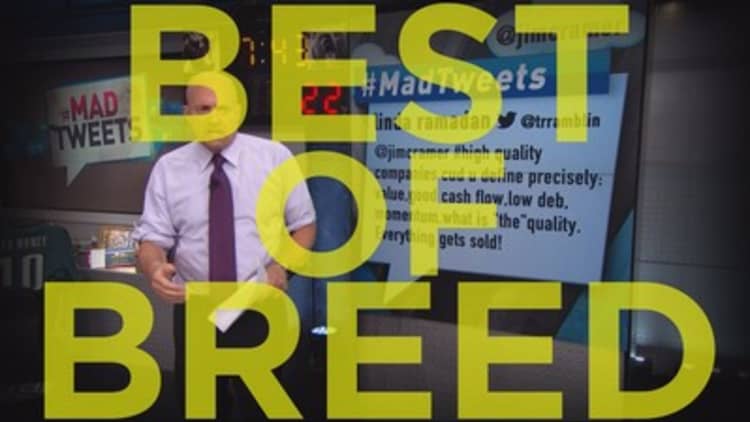
Every night, Jim Cramer goes on "Mad Money" with a mission to help people become better investors. Over the past 12 years of the show, that mission has transformed to match the surrounding environment.
The show first began as an outgrowth of Cramer's radio show called "Real Money." Back then, people craved specific investment ideas.
But everything changed when the 2008 financial crisis hit investors and tainted the way they viewed the market.
During that time, the downturn ravaged many big companies, especially in the financial sector, and caused a dramatic decline in economic activity.
"That era changed things, and it changed me. It changed the show," Cramer said.
"Mad Money" is no longer about just giving stock ideas, because, in Cramer's opinion, that is not enough anymore.
In fact, he now has deliberately minimized highlighting stock ideas. He would rather teach investors to understand the process and be able to pick stocks for themselves.
When Cramer was growing up, he learned how to invest the hard way. His father, "Pop," worked very hard selling boxes and bags to retailers, and it was tough to save money back then. Pop had money in a bank account, but it didn't pay much interest.
One day, Pop announced that he was going to take that money and buy the stock of National Video because his brother heard from a guy named Jack that it was the next big thing. At first the stock went up dramatically, and Pop was so happy, he kept buying more.
In fact, that was all Pop knew about the stock. He did not follow it intraday and had not researched the company. Eventually, the stock started to plummet and Pop lost everything on the investment.
"All I can say is that I'm glad for two things: one is that Pop never borrowed money to buy National Video, and two, that stocks blessedly stop at $0 on the way down," Cramer said.
After losing money on a few investments, Cramer decided to go to the library and research companies. Eventually, he found an oil company called Natomas, which had just discovered a large find in Indonesia.
He took $300 and bought the stock, and Natomas quickly caught a $1.4 billion takeover bid from former energy giant Diamond Shamrock Corporation.
Cramer realized from his investment in Natomas that by doing the homework, it gave him an edge over others and helped arm him with the proper knowledge about the stock.
From then on, Cramer was hooked on stocks and never turned back. Eventually, he made enough money to pay for his first year of law school at Harvard, where he decided to become an attorney.
"I recognized that you can study and you can pick worthwhile stocks that might be doing better than the average stock and that can, indeed, augment your savings provided you do it right, have some edge and stay current on the company," Cramer said.
When Cramer first started working at Goldman Sachs in 1984, he used to get calls from his mother, who loved the stock market and would ask him for quotes on her favorite stocks. She chose to invest by buying what she knew and staying on top of it.
She liked to shop at Giant Food, a progressive supermarket chain at the time, so she bought the stock. The process of homework back then was to like an idea through personal experience, read up on it with the best research, and then match those insights with other firms.
Cramer also learned during that time that sometimes Wall Street research can be very wrong, so it is good to have a healthy dose of skepticism.
"I want to show you that it isn't reckless to try to pick individual stocks, and those who say it is just don't understand the process of first-hand experience, married with research and buttressed by skepticism. It all increases the odds of successful individual stock investing while minimizing the risks of single-stock ownership," Cramer said.
When Cramer decided to leave Goldman Sachs after four years and open his own hedge fund, the first stock he bought was Heinz. He owned the stock because it represented a call on great management that could deliver earnings through thick and thin.
However, Cramer wasn't prepared for the performance demands of a hedge fund manager. He quickly learned that if he wanted a portfolio to perform daily, he would have to take daily action. You cannot just sit there and take a beating because you own best-of-breed companies.
"Heinz was a staple with a good dividend, and what I didn't understand at the time was when the economy heats up, people dump these kinds of stocks for something more cyclical," Cramer said.
The problem was that this rotation game is not one investors can play at home without being full-time professionals. And eventually, when the market got too hot, it crashed and all of the cyclical plays were decimated.
But guess what? Heinz snapped right back. That is what happens to best-of-breed, well-managed companies.
"As a homegamer, you can use the flailings of the hedge fund performers to your own advantage by picking up best-of-breed companies," Cramer said.
Questions for Cramer?
Call Cramer: 1-800-743-CNBC
Want to take a deep dive into Cramer's world? Hit him up!
Mad Money Twitter - Jim Cramer Twitter - Facebook - Instagram - Vine
Questions, comments, suggestions for the "Mad Money" website? madcap@cnbc.com



